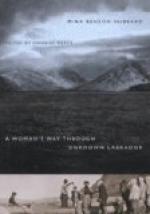CHAPTER XI
STORM-BOUND ON MICHIKAMATS
We had not reached our haven too soon. Almost immediately the wind rose again, and by noon was blowing so strong that we could have done nothing in any part of Lake Michikamau, not to speak of crossing the upper end in a heavy south wind. Around the point I did not find things look as I expected. It was only a very shallow bay, and where we looked for the islands a long, narrow point of land stretched out from the west shore to the northeast. Flowing round the eastern end of this point was a rapid, some two hundred yards in length, and at the head of this we found a little lake, between two and three miles in length, lying northeast and southwest. All the eastern portion of it was shallow, and it was with considerable difficulty we succeeded in getting the canoes up to the low shore, where we had lunch. I wondered much if this could possibly be Michikamats, which is mapped in, in dotted lines, as a lake twenty-five miles long lying northwest.
In the afternoon my perplexities were cleared up. A small river, coming down from the northwest, flowed in at the east end of the lake. Three-quarters of a mile of poling, dragging, and lifting brought us up to another lake, and this proved to be Lake Michikamats. For half a mile or more at its lower end the lake is narrow and shoal. Its bed is a mass of jagged rocks, many of which rise so near to the surface that it was a work of art to find a way among them. A low point ran out north on our left, and from this point to the eastern shore stretched a long line of boulders rising at intervals from the water. This line marks the edge of the shallows, and beyond it the lake is deep and broad and stretches away northeast for more than eight miles of its length, when it bends to the northwest.
As we entered it we saw that the low range of wooded hills on our left formed the western boundary of the lake, and over the flat wooded shore on the right we could see the tops of big, barren hills of a range stretching northward. These are a continuation of the round-topped hills which border the east shore of Michikamau south of where the lake narrows. For some miles of our journey up northern Michikamau we could see these hills miles back from the low shoreline. Now we seemed to be turning towards them again. Beyond a point one mile and a quarter north from where we entered the lake a deep bay runs in to the east, and here the hills came into plain view though they were still far back from the shore. Their rounded tops were covered with moss, and low down on the sides dark patches showed where the green woods were.




